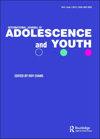调查心理赋权对青少年血友病患者使用应对策略、压力、焦虑和抑郁的影响:一项随机对照试验
IF 2.2
Q3 PSYCHOLOGY, DEVELOPMENTAL
International Journal of Adolescence and Youth
Pub Date : 2023-10-22
DOI:10.1080/02673843.2023.2270036
引用次数: 0
摘要
本研究探讨了心理赋权对血友病青少年使用应对策略、压力、焦虑和抑郁的影响。随机临床试验共招募了60名13-19岁的青少年血友病患者,随机分为干预组和对照组。测试工具包括抑郁、焦虑和压力量表21 (DASS-21)和Lazarus and Folkman应对策略问卷(LFCSQ)。干预组接受心理赋权。对照组给予常规干预。资料分析采用卡方检验和重复测量方差分析。结果显示,干预组在干预后焦虑、压力和抑郁的平均得分下降(p < 0.001),问题关注应对策略的使用增加(p = 0.007),与对照组有显著差异。心理赋权可以有效地改善应对策略的使用,减少血友病青少年的压力、焦虑和抑郁。本文章由计算机程序翻译,如有差异,请以英文原文为准。
Investigating the effect of psychological empowerment on using coping strategies, stress, anxiety and depression in adolescents with haemophilia: a randomized controlled trial
This study examined the effect of psychological empowerment on using coping strategies, stress, anxiety and depression in haemophilic adolescents. A total of 60 adolescents with haemophilia aged 13–19 years old were recruited in a randomized clinical trial and randomly divided into two groups of intervention and control. The instruments included Depression, Anxiety and Stress Scale-21 (DASS-21) and Lazarus and Folkman’s Coping Strategies Questionnaire (LFCSQ). The intervention group underwent psychological empowerment. The control group received routine intervention. Data were analysed with Chi-square test and repeated measures analysis of variance. The findings showed a decrease in the mean scores of anxiety, stress and depression (p < .001), and an increase usage of the problem-focused coping strategies (p = .007), in the intervention group after the intervention, that were significantly different with those of the control group. Psychological empowerment could be effective in improving the use of coping strategies and decreasing stress, anxiety and depression in adolescents with haemophilia.
求助全文
通过发布文献求助,成功后即可免费获取论文全文。
去求助
来源期刊

International Journal of Adolescence and Youth
PSYCHOLOGY, DEVELOPMENTAL-
CiteScore
8.80
自引率
2.20%
发文量
32
审稿时长
9 weeks
期刊介绍:
nternational Journal of Adolescence and Youth aims to identify, examine and compare particular issues, problems and policies related to adolescents and youth throughout the world. Subject areas covered include psychological growth and development, health and medical care, delinquency, social policy, employment and unemployment, education and training, spiritual and physical development, leisure, family relationships, sex education, homelessness. The Journal will be of interest to researchers in those areas, university and other higher education institutions, as well as to international, central and local government and voluntary organizations and field work agencies.
 求助内容:
求助内容: 应助结果提醒方式:
应助结果提醒方式:


